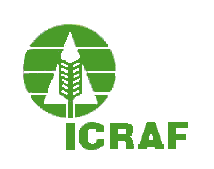
ICRAF concentrates on three tropical agro-ecozones-the humid, the subhumid and the semi-arid. Subsistence farmers with small landholdings practise much of the agriculture in these zones. As the population grows the land available becomes limited. Family holdings become smaller and smaller. Pressure on the land increases, and old, tried, sustainable systems of agriculture, which operated efficiently when land was more plentiful, break down. The land becomes degraded through nutrient depletion, overcropping and overgrazing, and fallow periods that become increasingly shorter and shorter. Soil fertility goes down, the soil erodes.
Agroforestry technologies can help these farmers increase their productivity and the sustainability of their operations. Agroforestry can build up soil fertility and prevent soil erosion. It can provide extra benefits, including cash in hand, for the farm family through various tree products-fodder, fuelwood, food, building materials and more.
Agroforestry can also alleviate tropical deforestation-a major present-day environmental concern. A principal cause of this deforestation is the slash-and-burn type of agriculture being carried out by landless farmers, many of them migrants to the tropical forests. Local farmers have through many generations evolved techniques to sustain their agricultural production with shifting cultivation. Unschooled in these subtleties, the new immigrants lay waste to millions of hectares of irreplaceable forest. The havoc they wreak contributes to global warming and exterminates whole species of plants and animals. Agroforestry can bring land-use alternatives. ICRAF is facilitating an initiative that will explore these alternatives, described in detail below. But preliminary research indicates that for every hectare put into agroforestry alternatives, five to ten hectares can be saved.
ICRAF P.O. Box 30677 Nairobi, Kenya phone: (254-2) 521450 telex: 22048 ICRAF fax: (254-2) 521001 email: CGNET CGI:236
Under these seven programmes, ICRAF has made available a number of resources. The Multipurpose Tree and Shrub Database, for example, under the multipurpose tree improvement programme, is one of many resources provided by ICRAF and disseminated by CIESIN. CIESIN will also be making available, on-line, Agroforestry Today, a quarterly publication of ICRAF.
Additional data sets may be located through CIESIN's Catalog System.